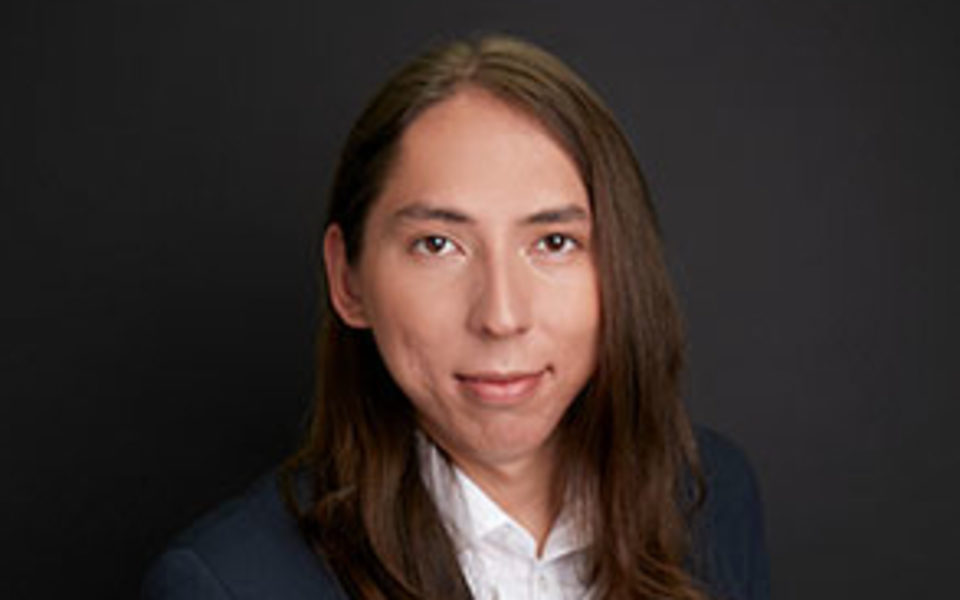
Kyle Edwards sips from a mug of black coffee, his voice rising above the clatter of dishes at a cafe across the street from his office. It’s been nearly a month since the Maclean’s magazine writer’s longest-ever story—4,200 words, pulled together in a time crunch of less than two months—was published, and he’s just starting to feel recharged.
“It takes a lot out of you. It almost feels like writing an essay overnight,” Edwards says with a laugh. “What I did after this story was, I pitched a bunch of goofy stories. Like, animal stories.”
The story, the big one, was about the disproportionate numbers of Indigenous children in Canada’s foster care system; a modern continuation of the residential school system, and yet another means of taking Indigenous children away from their homes. Edwards told the story of an anonymous expectant mother—given the pseudonym Jen—who planned to give birth in secret in hopes her child wouldn’t be taken away. Delivering her last baby in a hospital triggered a ‘birth alert’ with Child and Family Services, which immediately placed Jen’s newborn in care. Edwards also spoke with Tamara Malcolm and her son, Lee, reunited after he aged out of the foster care system. Lee lived in eight foster homes in 10 years. At 15, he’d attempted suicide.
Poring through findings from the Canadian Human Rights Tribunal, Edwards found the crisis was created by a system that incentivizes removing children from their families. “While most acknowledge that Indigenous kids in many households are at risk, they’re still frustrated that the default solution is to funnel those kids into care rather than confronting the social and economic problems that devastate families,” Edwards wrote in the article, published in early January. The concept had previously been covered in daily news stories, especially in Manitoba, but never fully tied together. Edwards also broke down complex policy documents few had read and explained the history behind the anecdotes, putting it all into context. The details were emotional gut punches, drawing responses online from policy makers like Indigenous Services Minister Jane Philpott.
It took a toll on Edwards, too. Edwards is Anishinaabe from Lake Manitoba First Nation, about an hour’s drive away from Ebb and Flow First Nation, where Jen and Tamara live. He hadn’t met them before, but they inhabited the same world. “Not many people know this, but Jen and Tamara, we’re from the same community,” he says.”Where Lee tried to kill himself is where I’m from. I grew up there. I played hockey there.” Though he didn’t grow up there, he and his family are members of Ebb and Flow, about 240 km north of Winnipeg—Edwards has been there often over the years, and his grandparents still live there.
Edwards’ mother had him when she was 16. She had never encountered Child and Family Services (CFS) though she works in child welfare now. “Even after it was published I felt really emotional about it because it just felt like, you know, it could have been me or my brother or someone else in my family who had come in contact with the system,” Edwards says.
Edwards didn’t pitch the story, his editors handed it to him. He used to work for Child and Family Services (CFS), and he says they thought he was the perfect person to write the story. In November, he spent a week in Manitoba, where the situation is especially bad. He made initial contacts through Facebook groups. One source led to another, then another. “They were really forthcoming with me,” Edwards says. “They really wanted to share their stories. I think they felt like they’d been ignored for a long time.”
In the end, he interviewed about 15 people for roughly an hour each. “When I was in Manitoba I was so exhausted. There’s something about travelling for work that’s not as glamorous as I think I thought it would be…You’re constantly running around, trying to find people in this short window you have to do interviews.”
When the the article and accompanying video came out, Philpott had already scheduled an emergency meeting in Ottawa about the situation for late January. Edwards covered the two-day summit for Maclean’s, spotlighting both the progress made and the lack of coherent plan of action. Beforehand, he had the chance to interview the federal minister one-on-one about the content of his feature. “Ever since then, she’s been tweeting all my stories,” he says, grinning. Philpott may not have enjoyed his final dispatch on the subject quite as much, running with the headline, ‘Are First Nations back to vague assurances on child welfare?’ “She didn’t tweet the last one. The last one was pretty critical.”
Edwards says there was so much he wanted to include in the piece, and so much pressure to get it right. His editors, however, appear to have been more than satisfied; though he’d been working for Maclean’s on a one-year contract when he wrote the foster care story, Edwards was offered a rare staff job at the magazine at the end of January.
Since then, he says he’s satisfied with the outcome, especially knowing that one of the most important angles he wanted in the story made it to the final product: a thorough debunking of the idea that 20th-century racists can be forgiven as products of their time, one he believes no one—let alone journalists—should entertain. “That argument pisses me off,” Edwards says.
In the article, he detailed the role of Dr. Peter Henderson Bryce, a medical inspector of residential schools in the early 1900s who wrote relentlessly about the atrocious conditions. Bryce was compassionate. He stood up for what was right, Edwards says, despite intense pushback from the federal government. “He really tried to force the government to fix the problem,” Edwards says. “I thought the historical context was important.”
About the author
Emma McIntosh is the digital managing editor for the RRJ for the 2017-18 masthead.